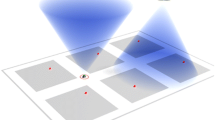Abstract
This work deals with the problem of automatically obtaining ANNs that cooperate in modelling of complex functions. We propose an algorithm where the combination of networks takes place at the phenotypic operational level. Thus, we evolve a population of networks that are automatically classified into different species depending on the performance of their phenotype, and individuals of each species cooperate forming a group to obtain a complex output. The components that make up the groups are basic ANNs (primitives) and could be reused in other search processes as seeds or could be combined to generate new solutions. The magnitude that reflects the difference between ANNs is their affinity vector, which must be automatically created and modified. The main objective of this approach is to model complex functions such as environment models in robotics or multidimensional signals.
Preview
Unable to display preview. Download preview PDF.
Similar content being viewed by others
References
Smalz, R., Conrad, M.: Combining evolution with credit apportionment: A new learning algorithm for neural nets. Neural Networks 7(2) (1994)
Opitz, D.W., Shavlik, J.W.: Actively searching for an effective neural network ensemble. Connection Sci. 8(3) (1996)
Moriarty, D.E., Miikkulainen, R.: Forming neural networks through efficient and adaptive coevolution. Evolutionary Computation 4(5) (1998)
Darwen, P., Yao, X.: Speciation as automatic categorical modularization. IEEE Transactions on Evolutionary Computation 1(2) (1997)
Goldberg, D., Richardson, J.: Genetic algorithms with sharing for multimodal function optimization. In: Proceedings of 2nd International Conf. on Genetic Algorithms (1987)
Deb, K., Goldberg, D.E.: An investigation of niche and species-formation in genetic function optimization. In: Proc. 3rd Int. Conf. Genetic Algorithms, pp. 42–50 (1989)
Coello, C., Van Veldhuizen, D., Lamont, G.: Evolutionary algorithms for Solving Multi-Objective Problems. Kluwer Academic Publishers, Dordrecht (2002)
DellaCioppa, A., DeStefano, C., Marcelli, A.: On the Role of Population Size and Niche Radius in Fitness Sharing. IEEE Trans on Evolutionary Computation 8(6) (2004)
García-Pedrajas, N., Hervás-Martínez, C., Muñoz-Pérez, J.: COVNET: A Cooperative Coevolutionary Model for Evolving Artificial Neural Networks. IEEE Transactions on Neural Networks 14(3) (2003)
Author information
Authors and Affiliations
Editor information
Editors and Affiliations
Rights and permissions
Copyright information
© 2005 Springer-Verlag Berlin Heidelberg
About this paper
Cite this paper
Bellas, F., Becerra, J.A., Duro, R.J. (2005). Evolution of Cooperating ANNs Through Functional Phenotypic Affinity. In: Cabestany, J., Prieto, A., Sandoval, F. (eds) Computational Intelligence and Bioinspired Systems. IWANN 2005. Lecture Notes in Computer Science, vol 3512. Springer, Berlin, Heidelberg. https://doi.org/10.1007/11494669_41
Download citation
DOI: https://doi.org/10.1007/11494669_41
Publisher Name: Springer, Berlin, Heidelberg
Print ISBN: 978-3-540-26208-4
Online ISBN: 978-3-540-32106-4
eBook Packages: Computer ScienceComputer Science (R0)




